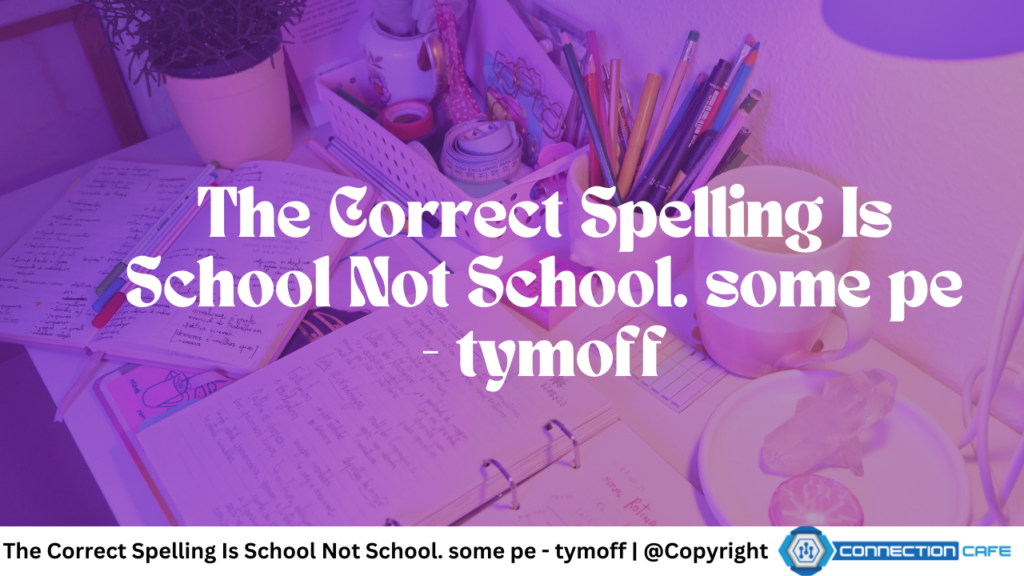Central to personal and societal growth is education. It equips people with essential knowledge and skills needed for success in life. Literacy, which involves reading and writing accurately, is a fundamental aspect of education.
One common and significant literacy issue is misspelt words like “school,” often written incorrectly as “shcool.” The mistake goes beyond typing errors; it highlights deeper educational and societal challenges.
This article examines the importance of accurate spelling, the hurdles facing literacy, and broader effects of the challenges.
The Correct Spelling Is School Not School. Some PE – Tymoff
Correct spelling, such as knowing that “school” is spelled with “ch” and not “sh,” is crucial for communication. Spelling errors can cause confusion and make messages unclear.
Accurate spelling reflects competence and carefulness within official and academic circles. Continuously misspelling words can harm a writer’s credibility.
Furthermore, accurate spelling is essential and Literacy includes reading, writing, and effectively using written language.
Misspelled words can make it harder to understand text and learn new information because they interrupt reading fluency and word recognition.
Literacy Challenges Associated with The Correct Spelling Is School Not School. Some PE – Tymoff
Lteracy is a complex journey influenced by various factors such as:
- Low-income Kids often encounter obstacles in literacy development. They may have low access to educational materials, less interaction with language-filled surroundings, and less chances for childhood education. Consequently, these kids may begin school with poor reading & writing abilities compared to privileged peers.
- Education quality varies greatly among regions and schools. In some places, schools suffer from lack of funding, shortage of teachers, and insufficient resources. These shortcomings can significantly hinder students’ learning and literacy development. Poor educational infrastructure leads to larger classes, which means students may not receive adequate individual attention.
- Learning Disabilities pose additional challenges. Conditions like dyslexia, for instance, affect reading and spelling accurately by impairing word recognition and processing. It’s essential to identify such students early and provide them with appropriate support to help them.
- Cultural attitudes toward education greatly influence literacy. In cultures where education is valued, children are often encouraged to succeed academically. However, in other cultures, formal education may be less focused on, with children expected to participate in tasks early on. These differences can shape how much importance is placed on a child’s literacy development.
Broad Implications of Challenges
The implications of literacy challenges extend beyond individuals to society. Literacy is crucial for personal growth and contributes to advancements.
- Literacy provides opportunities for lifelong learning and critical thinking. It allows access to information and full societal participation. Lacking basic literacy, people may find everyday tasks difficult.
- Economically, higher literacy rates correlate with increased workforce participation, educational attainment, and economic contribution. Conversely, low literacy can restrict job options and perpetuate poverty cycles.
- Socially, literacy fosters community engagement and civic involvement. Literate individuals are more informed about societal issues, actively engage in communal affairs, and champion their rights. Being well-informed and engaged is vital for the success of democratic societies.
Confronting the Challenges of Literacy
To tackle literacy challenges, collaboration among different groups is essential.
- Governments are pivotal in this effort. They need to ensure quality education is accessible to everyone by investing in school infrastructure, allocating sufficient funds for education, and enacting policies that support literacy. Initiatives like free public schooling and teacher development courses can greatly enhance literacy rates.
- Improving education involves making changes that meet students’ needs and enhance learning quality. This can mean updating curricula to focus on developing literacy skills, minimizing class sizes for better individual support, and using technology to improve teaching. Schools must support learners with learning challenges.
- Parents are vital in children’s literacy development by promoting home reading, providing books, and participating in language-filled activities. Education involvement helps create a good perception about literacy and academic success.
- Communities play a crucial role in promoting literacy through initiatives like setting up community libraries, reading programs, and tutoring. These efforts create a supportive environment which values education.
- Integrating technology can also boost literacy skills. Educational apps, e-books, & online tools offer extra learning chances. Technology enables personalized learning, allowing students to learn based on their own speed and get instant feedback.
Conclusion
Getting the spelling of trivials like “school” right may appear minor, yet it underscores the significance of literacy together with the hurdles in attaining it. It is essential for personal growth, economic advancement, and community unity.
Overcoming literacy challenges demands a holistic strategy involving government action, educational improvements, parent engagement, community backing, and the integration of technology. Together, lets ensure everyone has the chance to boost literacy and realize their abilities to the fullest.


